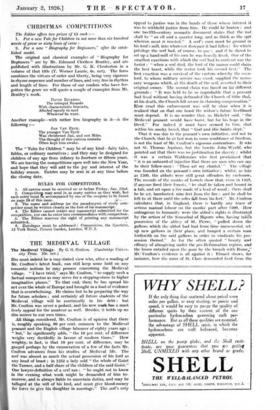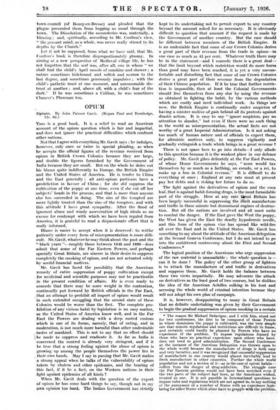- THE "MEDIEVAL - - VILLAGE His must indeed be a rosy-tinted
view who, after a reading of Mr. Coulton's latest book,T, can stilt keep some hold on any romantic notions he may possess . concerning the Medieval village. "I have tried," says Mr. Coulton, to supply such .a factual conspectus as may serve for a stepping-stone to higher imaginative, planes:" To -that end, then; he has spread his net over the whole of Europe _and brought in a load of evidence that is overwhelming. He claims but to be preparing the way for future scholars ; and certainly all future students of the Medieval_ village will be continually in his debt ; but Mr. Coulton was never a pedant, and his new_wark -has a most lively appeal-for the amateur as well. Besides, it holds up no dim mirror to our own tithes.
All things considered, Mr. Coulton is of opinion that there is, roughly speaking, 90 per cent. common to the Medieval peasant-and the English village labourer of eighty years ago ; "but," hi significantly adds, "the 10 per cent. of difference weighs very decidedly in favour of modern times." How weighty,- in fact, is that 10 per cent. of difference, may be gauged perhaps by the enumeration of a few of the facts Mr. Coulon advances from his studies of Medieval life. The serf was almost as much the actual possession of his lord as any head of beast ; in 1252 a lady sold "the whole of Guiot the Tanner, and a half share of the children of the said Guiot." One lawyer-definition of a serf ran : "he ought not to know in the evening what work might be demanded of him to- morrow, and is always liable to uncertain duties, and may be tallaged at the will of his lord, and must give blood-money for leave to give -his daughter in marriage." The serfs only
appeal to justice was in the hands of those whose interest it was to withhold justice from him. He could be beaten ; and
• one twelfth-century monastic document states that the rod shall be "an ell and a quarter long, and as thick as the spit whereon meat is roasted." A serfs corn must be ground in his lord's mill, into whatever disrepair it had fallen : for which privilege the serf had, of course, to pay ; and if he dared to - set up a hand-mill of his own he was heavily fined. One of the cruelest exactions with which the serf had to contend was the heriot : "when a serf died, the lord of the manor could chant the best beast, while the rector took his second best." The first exaction was a survival of the custom whereby the over- lord, to whom military service was owed, supplied the neces- sary weapons which, at the death of the serf, reverted to their original owner. The second claim was based on far different grounds : "It was held to be so improbable that a peasant had lived without having defrauded 'the Church of tithe that, at his death, the Church felt secure in claiming compensation." _flow cruel this enforcement was' will be clear when it is . realized "that On that one beast the widow's future livelihood must depend. It is no wonder that, as Michelet said, " the . Medieval peasant would have burst, but for his hope in the Devil." For indeed it must have seemed to him, shut within his smoky. hovel, that " God and His Saints slept."
That it was due to the peasant's own initiative, and not to -the Church, that he at-last won to soine*semblance of freedom, is not the least of Mr. Coulton's vigorous contentions. It was not St. Thomas Aquinas, but the heretic John Wyelif, who pointed out that there was no justification for slavery ; whilst - it was a certain Waldensian who first proclaimed that "it is an unheard-of injustice that there are men who can say to their 'fellow-men: ' Thou art my chattel.' " 'the village was founded on the peasant's own initiative"; whilst, as late , as 1500, the abbots were still west offenders by enclosure. The records of the monks of Lorisch- show that, even in 1423,
• if anyone fired their forests, "he shall be taken and bound in -a tub, and set-upon' a• fire made Of a load of wood : there Shall
• he be set, barefooted, nine feet from the fire : and lie shall be
• . . left to sit there until the soles fidl from his feet." Mr. Coulton
calculates that, in England, there- is hardly any trace of serious manual labour -on the monks' part after 1300. How outrageous to humanity were the abbot's rights is illustrated by the action of the Seneschal of Bigorre who, having taken possession of the abbey of St. Pierre, "pulled down the . gallows which the-abbot had had from time immemorial, set up new gallows in their place, and hanged a certain 'man forthwith on the said gallows in order to vindicate his pos- session thereof." As • for the often quoted beauty and efficacy of almsgiving under the pre-Reformation regime, and the losses- entailed upon the poor by the breach with Rome," Mr."Coulton's evidence is all against it : Ebrard shows, for instance, how the nuns of St. Clare demanded food from the town-council (of Bourg-en-Bresse) and pleaded that the plague prevented them from begging as usual through the town. The Dissolution of the monasteries was, materially, a blessing ; and, spiritually, according to Mr. Coulton's view,
"the peasant mind, as a whole, was never really stirred to its , depths by the Church."
Let it not be supposed, from what we have said, that Mr. Coulton's book is therefore disproportionately gloomy. In aiming at a new perspective of Medieval village life, he has not forgotten that the serf was, after all, one in whom "we shall find the child's April moods of sunshine and shower ; a nature sometimes hidebound and selfish and narrow to the last degree, and sometimes generously impulsive ; with the child's pathetic trust at one moment, and unreasonable dis- trust at another ; and, above all, with a child's fear of the dark." If he was sometimes a Caliban, he was sometimes Chaucer's Plowman too.











































 Previous page
Previous page